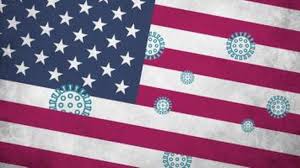Politics is Killing Americans
The deadly consequences of political maneuvering have been exposed in the US

March 31, 2020
About 90 days ago, the New York Times unsuspectingly published an article entitled, “China Identifies New Virus Causing Pneumonialike Illness.” The deck innocently details, “The new coronavirus doesn’t appear to be readily spread by humans, but researchers caution that more study is needed.” 30 days later, the White House called together a Coronavirus Task Force. Today, about 60 days later, the virus has infected over 130,000 Americans and killed nearly 35,000 globally.
The coronavirus fallout came like an avalanche: initial rumblings caught the attention of a few, but the emergency quickly gained overwhelming speed, leaving millions in a state of wide-eyed paralysis as the disaster touched every part of our lives.
For students around the world, the coronavirus pandemic has meant an indefinite suspension of in-class instruction. In Scituate, there has been a turbulent rollout of an extended off-site learning program. In good faith, Scituate administrators have attempted to follow the ever-changing procedural guidelines provided by higher governmental authorities.
So why has this crisis managed to catch the nation’s governors and Washington off guard? And why don’t we have more robust contingency plans?
The federal government will have a hard time answering why they weren’t prepared for an emergency like this one–the COVID-19 pandemic is neither unprecedented in American history, nor has the past two decades of leadership been opposed to trillions in preemptive spending in the name of public health and security.
Clearly, this situation isn’t an issue of the political party; a Democrat president would likely have responded to this issue in the same frustratingly slow fashion as Trump. Instead, the coronavirus emergency has proven—with grave consequences—the entirely over-political nature of our government.
Donald Trump is smart enough to realize the extreme danger this crisis poses to his reelection. The performance of the nation’s economy is the president’s greatest selling point, particularly for the undecided voters whom Trump is desperate to hold onto. Despite expert indications that said otherwise, President Trump tried to maintain a register of indifference about the virus’ threat to Americans.
Within the same 24-hour period when the World Health Organization (WHO) raised its Coronavirus alert to the most serious level, the number of cases passed 50,000 in China, the 20th case developed in the USA, and President Trump told to a packed rally audience the situation was “(the Democrat’s)…new hoax.” The same sentiments were echoed across the right-wing media sphere for a few weeks. President Trump and his surrogates have also repeatedly referred to COVID-19 as the Chinese or Wuhan virus, despite the WHO discouraging these types of labels to the virus.
There was eventually a slight change in Republican rhetoric, but one that came too late for the afflicted and the at-risk. Trump’s inappropriate, stupid rhetoric is not surprising, but his attempt to create a political backdrop for the coronavirus pandemic is an alarming indication of the way politics has diluted the effectiveness of government. When the nation experiences smaller tragedies, like a mass shooting or wildfire, Washington has a reliable response playbook: first are the meaningless condolences, which are followed by a predictable set of policy proposals. In these circumstances, politics seem more appropriate, at least because, unlike with the Coronavirus pandemic, the loss of life was unexpected but contained. Realistically, the solutions for solving gun violence and environmental disasters will involve politics, whereas the prompt interagency bureaucratic response needed to curtail the spread of a virus is only impeded by politics.
The reason for our government’s stumbling response to COVID19 is entirely political. In Washington, it’s always election season, whether for the presidency, the House, or the Senate. In the contemporary campaign environment, it will always be advantageous—particularly for members of Congress—to nurse pet projects and latch onto the most easily marketed political issues. Although the importance of infectious disease prevention is now better understood by the public, six months ago it would have been politically wasteful for any member of Congress to place a substantial focus on such a niche concern.
The same consequences of politics are why there were no significant cautionary voices in the pre-Depression congresses. How grateful would millions of Americans be had these issues been focused on before they became national crises? Or more hauntingly–how many more Americans would still be alive?
It is critical that the efforts of doctors and nurses–and the suffering of those who have perished–do not go in vain. This international tragedy has exposed the deadly consequences of political maneuvering. It’s important to look for glimmers of light during this trying period. There is hope that the generation of Americans who survive COVID-19 will lead the world with a willingness to make political sacrifices in the name of preventing the recurrence of the nightmare we find ourselves in today.